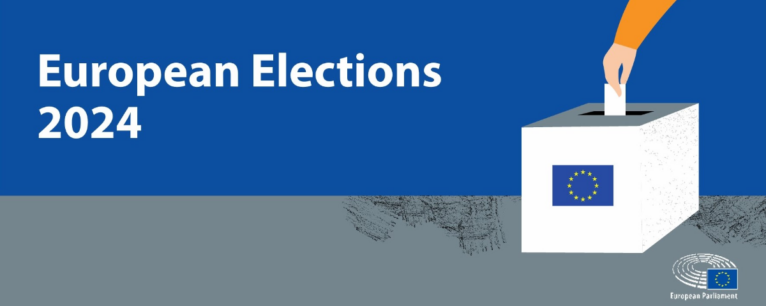European Parliament Elections 2024: Prospects for the Environment?

It might seem strange on a site dedicated to Brexit and the Environment to have a blog on the European Parliament (EP) elections. Since Brexit UK citizens no longer have the right to vote in the European elections unless they hold joint citizenship for another EU country. However, leaving aside EP-nerds like me who enjoy nothing more than pondering the runners and riders in Euro elections, there are a lot of good reasons to take an interest in these elections, especially from an environmental perspective.
A major concern for green activists in the run up to Brexit was that leaving the EU would lead to a weakening of UK environmental protection, with the unspoken assumption that the EU was and would continue to be more environmentally progressive than the UK. However, the 2024 European elections are likely to see a rightward shift in the EP to parties that tend to be more sceptical about environment and climate policies. The assumption that the EU is a more progressive environmental actor than the UK may no longer hold true. EU politics and environmental ambition look set to change after the June 2024 elections with implications for the UK.
What a difference five year makes….
In the 2019 European elections, the last in which UK citizens could participate, voting took place against a backdrop of rising public concern about climate change, and widespread activism by young people who took to the streets as part of the school strikes for climate. The EP saw the first ever increase in turnout for European elections – and a significant increase in turnout amongst younger voters (+14 percentage points amongst under 25s and + 12 percentage points for 25-29 year olds). 37% of respondents to a Eurobarometer survey claimed that concern for climate and the environment prompted them to vote in the European elections. The elections also saw the strongest ever performance for the Greens in European elections, seeing them gain 10% of the vote across Europe and 55 seats.
Ursula von der Leyen who was appointed Commission President after the Council rejected the EP’s preferred candidate Manfred Weber, needed to appease the Parliament and moved to put in place an ambitious environmental platform the European Green Deal (EGD). The EGD seeks to secure green growth in Europe by creating new jobs, whilst making the EU the world’s first climate-neutral continent by 2050. To reach the ‘net-zero’ target by 2050, the EU adopted a milestone of reducing net emissions by 55% compared to 1990-levels by 2030. To deliver on this ambitious goal the Commission proposed revising and updating legislation via its ‘Fit for 55’ climate package. Beyond climate change the EGD also covers energy transitions; the circular economy; energy efficiency in buildings; sustainable mobility; food and farming; biodiversity protection; pollution control; and sustainable finance.
Fast forward to 2024 and we have a very different context. The combined impact of the war in Ukraine and associated cost of living crisis and concerns about security, particularly in the EU’s Eastern members, has seen climate and environment drop down the political agenda. In her platform for election Von Der Leyen has emphasised defence and growth as her two key priorities. She has faced criticism from the left and Greens for watering down greening agri-environment measures in response to farmers’ protests ahead of the elections and for her ‘flirtation with Meloni’, Italy’s populist far-right Prime Minister.
However, she has also been criticised from the right. Her own national party the Christian Democratic Union (CDU) has disowned and pledged to set aside a key plank of the Fit for 55 strategy, the car emissions directive which commits to zero car emissions by 2035. Opposition to heat pumps a key way for Germany to meet ambitious GHG reduction pledges, has also become a totemic issue for the far right in Germany. The Greens are predicted to do badly in the polls in their traditional heartlands of Germany and Austria where climate change has been framed as an expensive luxury. More widely, across the Union the Commission’s Green Deal has become a key target for attack from the right.
And it appears to be working for them – the polls suggest that far right and populist groups will do better than ever before. Some experts have suggested that this may have implications for the ‘foreign policy choices that the EU can make, particularly on environmental issues, where the new majority is likely to oppose ambitious EU action to tackle climate change‘.
Equally one challenge for the right is finding enough common ground to be able to form a stable coalition that can either adopt measures or block those they disagree with. Already in this election campaign AfD, the far-right German group, which had predicted to do well in elections has been ejected from the Identity and Democracy Group due to the statement made by its party leader suggesting that members of the Waffen-SS were not automatically criminals.
What does all this mean for the future of EU environmental policy? The ambition that characterised von der Leyen’s first few years in office will undoubtedly wane as the EU turns it eyes to its Eastern neighbourhood. Whilst it seems unlikely that legislation that has already been adopted will be watered down, it does seem probable that as in the aftermath of the financial crisis, we will see a slow-down in policy production and when policy is proposed it will have less ambition and involve a closer scrutiny of costs.
One implication of this rise of the right and cooling in EU environmental ambition is that UK-based green activists may no longer be able to rely on the EU being a green pace-setter pulling the UK in its wake. Now the UK has taken back regulatory control a key question is whether its environmental domestic ambition will further falter without upwards regulatory competition from its near neighbour. The manifestos of the key parties for the upcoming UK general election should give some hints in this regard. Fortunate then that Brexit and Environment will be reporting on that very subject as soon as the manifestos are available. Watch this space.




